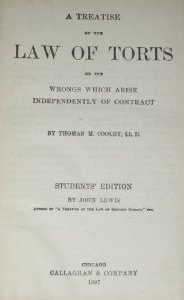In every
jurisdiction, law imposes a duty to respect and not to violate rights vested to
the members of its society. Any individual committing a breach of such duty
commits a wrong OR his such an act is said to be wrongful.
Rights are
generally classified as public rights and private rights.Public rights are
those which affects the entire society, whereas the private rights are those
which affects the individual. It is often said that, a wrong which is not a
crime, which is not a breach of contract or which is not a breach of trust is a
wrong of tort.
The word tortis
derived from the Latin word tortum, which means twist. Like all
other wrongs, tort is a wrongful act whereby the wrongdoer commits the breach
of legal right vested in some individual.Tort is a civil wrong but not all
civil wrongs are torts.
Tortious
liability arises from the breach of a duty primarily fixed by law. This duty is
towards the persons general and its breach is redressable by an action for
unliquidated damages. Three main elements in tort are;
- Civil Wrong
- Civil wrong other than a breach of obligation under a contract or trust; and
- Claim is always for unliquidated damages
Tort belongs
to the category of civil wrongs. The basic nature of wrong is different from
criminal wrong. In case of civil wrong the injured party or the plaintiff
institutes civil proceedings against the defendant. The main remedy available
under tort is damages.
If a civil
wrong does amount to breach of contract or trust then it is a tort. It is often
said that, if civil wrong is neither of these, then it is a tort. Monetary
compensation in most torts is the only remedy available to the aggrieved party,
and monetary compensation, by the very nature of the wrong cannot be claimed in
fixed sum of money: the final determination of damages or monetary compensation
is to be made by the court.
Nature of a
tort can be understood by differentiating
- tort and crime; and
- tort and breach of trust
What is the difference between tort and crime?
In order to
understand the concept of law, we always try to distinguish the same from
crime. In crime we find that, the normal marks are that, the state has power to
control the procedures to remit the penalty or to inflict punishment.
There are
various wrongs which find the place both under criminal law and law of torts.
Some examples of such wrongs are; assault, defamation, negligence, conspiracy,
and nuisance. Definition of any of these wrongs may be different under civil
and criminal laws.
For the
purpose of civil liability for any one of the wrongs, the rules of torts will
be applicable and for the purpose of criminal liability the rules of criminal
law will be applicable.
In case of
crime the offender is prosecuted in a criminal court and if the offence is
committed, it will result in a jail term or fine or both. In case of a civil
wrong, it is only monetary compensation that can be awarded. In no case, the
person who has committed a tort can be sentenced to a jail term.
Tort and breach of contract
When parties
have voluntarily undertaken certain obligations under a contract, and any party
commits a breach of that obligation, he commits a breach of contract. Whereas,
in tort, the obligation is imposed by the law and when a person commits a
breach of said obligation, he may be guilty of committing tort.
In both tort
and breach of contract, the usual remedy is by way of monetary compensation,
though in a contract, the compensation may be liquidated amount, while in torts;
it is always as an unliquidated amount. Sometimes, in both tort and breach of
contract, injunction may be the only remedy.




No comments:
Post a Comment